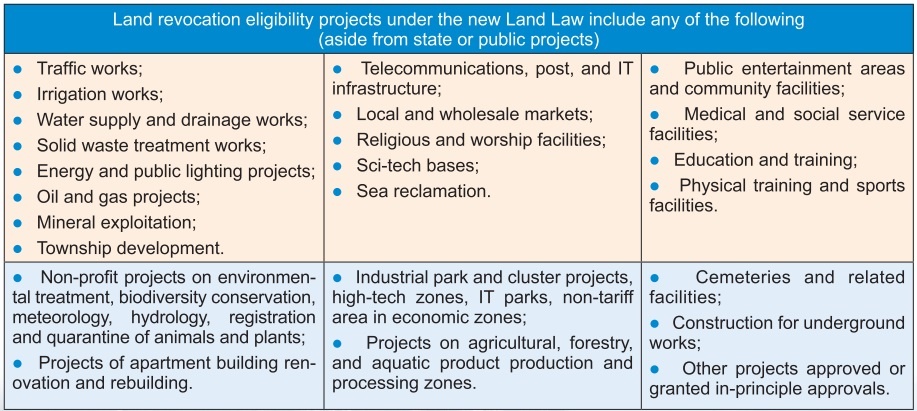INTERNATIONAL INVESTMENT
AND PORTAL
 Lawyers Duyen Ha Vo (left) and Tram Dang from VILAF
Lawyers Duyen Ha Vo (left) and Tram Dang from VILAF
A land revocation eligibility project (LREP) is a project considered eligible as socioeconomic development based on the national and public benefit, allowing the state to reclaim land from existing occupants. A list of LREPs has existed under previous land laws for many years, but the new Land Law has extended and intricately categorised the list.
Examples of new items added to this list are medical facilities, educational and training facilities, renovation and rebuilding of apartment buildings, and sea reclamation projects.
Examples of projects not considered LREPs are hotel projects, housing development projects and commercial complex development projects (to the extent that they are not township development projects).
The implications of the list of LREPs unfold in three ways. Firstly, a proposal for a LREP allows the state to reclaim land from current occupants. The investor may advance the costs of compensating these occupants for resettlement according to statutory procedures to expedite the land reclamation process.
Afterward, the state allocates or leases the reclaimed land to the investor for developing the specified project. Qualified resettlement and land clearance costs are offset against the land use fee or rental payable to the state.
Secondly, the selection of an investor for such a project may be subject to investor selection tendering requirements in certain cases.
Thirdly, it is permissible to propose an LREP on land acquired through a private agreement with existing land users (as opposed to land allocation or directly lease from the state), subject to approval from the provincial people’s committee.

Private agreements
If that land is not under control by any state agency, project development may be proposed on such land acquired through a private agreement with the current land users, as opposed to obtaining it through a land lease or allocation directly from the state.
This scheme is applicable regardless of whether the proposed project is an LREP or otherwise, provided that it is for a commercial housing project, this scheme may apply only to delivery of residential land, and the LREP application is approved by the provincial people’s committee.
The provision on private agreement for project development is a new inclusion in the Land Law, awaiting further regulatory guidance from the government to delineate its implementation and applicable procedures. However, because foreign owned enterprises are not eligible to directly acquire land from existing users other than land in industrial parks and high-tech parks or via a capital contribution of land use rights, it appears that the above scheme of private agreement for project development is not available to foreign owned enterprises unless the acquisition is made in the form of a capital contribution of land use rights.
In addition, investor selection tendering requirements apply to limited cases. Investor selection tendering refers to the tendering organised by the pertinent local state agency to select investors for a project. The relevant state agency then allocates or leases the subject land to the selected investor for the project.
Under the new Land Law, land allocation or lease for project development through tendering is mandatory only for township development projects presented to investors via tendering by a provincial people’s council, and LREPs falling under a category that requires tendering as per the regulations applicable to the respective sector.
In late November, the Ministry of Planning and Investment released a draft decree on tendering to implement the new Law on Tendering for evaluation. This proposed regulation consolidates and provides guidance on the list of projects subject to tendering under regulations governing specific sectors or fields. Tendering applies to those projects if they are LREPs or involve the use of land currently under the control of a state agency, and they are ineligible for land auction under applicable laws.
As per the above proposed regulation, such tendering can encompass international football betting, domestic solid waste treatment, specialised aviation services at airports, and joint ventures with state-owned enterprises involving changes in land use purposes. Additionally, education and training facilities, sports facilities, horse racing or greyhound racing ventures, and apartment building renovation or rebuilding projects also fall under such a category if at least two potential investors express interest in participation.

Completing processes
There may be confusion regarding how the above provisions of the draft regulation interact with the permission for private agreement for acquisition of land under the new law. Taking the example of a proposed education institution project, if the draft regulation is issued in its current form, it is unclear whether the investor may seek approval of the provincial people’s committee to enter into a private agreement with existing land users to acquire land use rights pursuant to the Land Law, without triggering the obligation of the relevant state agency to publish invitations for expression of interests for determination of whether tendering is required.
Under the new law, within 36 months from the decision recognising successful bidding results or otherwise as specified in the contract, the people’s committee must complete land resettlement and clearance for the winning bidder to be leased or allocated the land. The successful bidder must promptly provide the required capital for these activities.
If, after six months of receiving the request for provision of capital for such activities, the investor fails to advance sufficient capital, the relevant state agency may cancel the bid results as per the contract. Meanwhile, land auction requirements apply to state-controlled land, with certain exceptions.
A land auction is the process where the local state agency auctions land for project development. The successful bidder pays a land use fee or rent to secure the allocation or lease of the land as determined in the bid. If the subject land is clean land under the control of a state agency, land auction is mandatory to obtain such land for project development, unless exempt as discussed or subject to mandatory tendering.
The land offered for auction must be clean land, meaning it has been reclaimed from existing occupants with compensation for land resettlement having been disbursed, and it must have connections to road infrastructures.
Accordingly, the new law provides more clarity on cases subject to land auction and those not. In comparison, the old law provided a vague and broad list of cases subject to land auction, which included commercial housing development, infrastructure development, use of commercial land, and use of industrial land.
Regardless of any other requirement, several land allocation or lease cases are also not subject to land auction or tendering.
 A new property market cycle is beginning for Vietnam
A new property market cycle is beginning for Vietnam
The new Land Law should promote market mechanisms, regulate interest groups, put people first, and minimise disparities between real estate businesses.



















